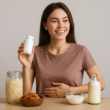If you’ve ever found yourself staring at a wall of yogurt containers labeled “probiotic” and wondering what exactly that means—you’re not alone. Probiotics have become a health buzzword, but there’s solid science behind the hype. These live microorganisms, often referred to as “good bacteria,” are essential for keeping your gut balanced, your immune system sharp, and even your mood in check.
Want a deeper dive into the basics? Healthline breaks down what probiotics are, the different types, and why they matter.
A Happier Gut Starts Here
One of the most talked-about benefits of probiotics is how they support digestion. They help maintain the balance of bacteria in your gut, which is crucial for everything from breaking down food to absorbing nutrients. If your gut’s off balance, you’ll know it—gas, bloating, constipation, or worse.
Probiotics can be especially helpful after a round of antibiotics, which tend to wipe out both bad and good bacteria. Adding probiotics to your routine during recovery can help shorten the duration of diarrhea, according to the World Health Organization.
They’ve also shown promise for those dealing with irritable bowel syndrome (IBS). Research published in the Journal of Gastroenterology found that certain probiotic strains can ease symptoms like bloating, abdominal cramps, and irregularity.
Even constipation gets some relief, thanks to strains like Bifidobacterium lactis, which have been linked to more regular bowel movements and reduced discomfort. It’s not magic—it’s microbes doing their job.
Immune Boost, Courtesy of Your Gut
Believe it or not, a large part of your immune system lives in your digestive tract. That’s why gut health and immunity go hand in hand. When your gut is healthy, your immune response tends to be more balanced and effective.
Studies reviewed by the American Journal of Clinical Nutrition suggest that a robust microbiome can help you fend off infections and reduce chronic inflammation. Think of it as your internal defense system getting regular tune-ups, thanks to a healthy dose of good bacteria.
This isn’t just about fighting off the occasional cold. A well-functioning immune system also means fewer allergic reactions, better response to vaccines, and a more stable inflammatory response overall.
The Surprising Link Between Gut and Mood
There’s a growing field of research exploring the gut-brain connection, and it’s fascinating. Scientists now know that your digestive system and your brain communicate through a network called the gut-brain axis. Probiotics appear to play a key role in this communication.
According to a review in Nutrients, certain probiotic strains may help ease anxiety and depression. While they’re not a replacement for therapy or medication, they can be a helpful complement, especially for those looking for a more holistic approach to mental wellness.
It’s early days in this area of research, but the results are promising. Probiotics might help regulate stress hormones, reduce inflammation that affects the brain, and even improve sleep. Not bad for tiny organisms you can find in a spoonful of yogurt.
Clearer Skin from the Inside Out
Your skin is a reflection of what’s going on inside your body, and the health of your gut can show up on your face. That’s where probiotics come in—again.
Conditions like acne, eczema, and rosacea may be linked to imbalances in gut bacteria. While more research is still needed, dermatologists are increasingly looking at probiotics as a supportive treatment for these common skin issues. The American Academy of Dermatology has noted that both oral and topical probiotics can help improve skin’s barrier function and reduce inflammation.
It’s not about trading in your moisturizer for sauerkraut—but pairing the right skincare routine with a gut-friendly diet might give you that extra glow.
Easy Ways to Get More Probiotics Into Your Day
Adding probiotics to your routine doesn’t require a drastic lifestyle overhaul. In fact, it can be as simple as choosing the right foods or drinks.
Fermented foods are a natural source of probiotics. Think tangy yogurt, effervescent kombucha, spicy kimchi, or hearty miso soup. These not only taste great but also help populate your gut with beneficial bacteria. Medical News Today offers a great roundup of probiotic-rich foods.
Supplements are another option—especially if your diet doesn’t include a lot of fermented foods. Just be sure to choose a product with strains that match your health goals, and talk to your doctor if you’re unsure where to start.
Don’t forget about prebiotics—the “food” for probiotics. These are found in fiber-rich foods like bananas, garlic, onions, and asparagus. Together, prebiotics and probiotics make a powerful team for gut health.
Choosing the Right Probiotic
Not all probiotics are created equal, so it pays to do your homework. Different strains serve different functions, from aiding digestion to boosting immunity or balancing mood.
You’ll also want to look at CFUs (colony-forming units). A higher count generally means more active bacteria, but more isn’t always better—what matters is matching the strain and dose to your needs. Be wary of overly hyped products with vague ingredient lists.
Storage matters too. Some probiotics need refrigeration to stay viable, while others are shelf-stable. Stick with reputable brands and check third-party testing when possible. ConsumerLab is a great resource for independent supplement reviews.
What About Side Effects?
Most people can take probiotics without any problems, but that doesn’t mean they’re risk-free. Some people might experience mild bloating, gas, or an upset stomach when starting out. That’s usually your body adjusting to the influx of bacteria.
Start slow and monitor how your body reacts. And if you have a weakened immune system or serious health conditions, talk to a healthcare professional before adding probiotics to your routine.
Final Thoughts: Good Bacteria, Great Results
Probiotics aren’t a cure-all, but they’re a powerful ally when it comes to maintaining balance in your body. From smoother digestion and stronger immunity to potential benefits for your mind and skin, they’ve earned their place in the spotlight.
So go ahead—embrace the yogurt aisle, sip some kombucha, or explore a supplement that works for you. Your gut (and probably a few other parts of your body) will thank you.
Further Reading:








